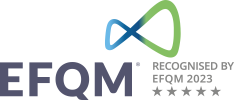Within the scope of the TÜBİTAK 1812 Investment-Based Individual Young Entrepreneurship Program (BİGG) 2024 2nd Term application, the project titled "Production of Sustainable Protein Powder and Bioactive Peptides from Tea Waste Using Biotechnological Methods" received the Seal of Excellence and was deemed eligible for support. As part of this achievement, Res. Asst. Hikmet Bayam from the Faculty of Health Sciences, Department of Nutrition and Dietetics; Asst. Prof. Dr. Şefik Tekle, a faculty member from the Faculty of Engineering and Architecture, Department of Food Engineering; and Assoc. Prof. Dr. Fatma Ergün, a faculty member from the Faculty of Health Sciences, Department of Nutrition and Dietetics, visited Rector Prof. Dr. Mustafa Kasım Karahocagil. During the visit, Rector Karahocagil expressed his gratitude to the project team, emphasizing that the recognition of R&D efforts was valuable for scientific encouragement. He noted that the study would contribute significantly to the field and wished the project team success in their future endeavors.
The project titled “Production of Sustainable Protein Powder and Bioactive Peptides from Tea Waste Using Biotechnological Methods,” led by Res. Asst. Hikmet Bayam, a faculty member from the Faculty of Health Sciences, Department of Nutrition and Dietetics, has been awarded the Seal of Excellence under the TÜBİTAK 1812 Investment-Based Individual Young Entrepreneurship Program (BİGG) 2024 2nd term call and deemed eligible for support. The project idea was selected as one of 133 initiatives out of 343 business plans and received the Seal of Excellence following evaluations by TÜBİTAK panelists and the BİGG Fund. With a budget of 900,000 TL, the project includes Asst. Prof. Dr. Şefik Tekle, a faculty member from the Faculty of Engineering and Architecture, Department of Food Engineering, and Assoc. Prof. Dr. Fatma Ergün, a faculty member from the Faculty of Health Sciences, Department of Nutrition and Dietetics, as researchers. The project will be carried out under Erciyes Technopark with the establishment of a company.
The project aims to repurpose tea waste by developing a sustainable production model through a biotechnological and innovative enzymatic hydrolysis method. This aligns with the objectives of Turkiye's 12th Development Plan, particularly contributing to the implementation of a "circular economy," which prioritizes the reuse of waste generated from resource consumption. Additionally, the project supports Turkiye's National Technology Initiative by utilizing local and national resources. The project is designed to encourage Turkiye's agricultural production and industrial capacity, while promoting economic independence and the efficient use of local resources. It also aims to establish policies for the use of plant-based proteins, with low carbon and water footprints and reduced greenhouse gas emissions, in sports nutrition, aligning with the net zero emissions target for 2053. Furthermore, it seeks to pave the way for the development of alternative protein sources. By supporting the policy from the 12th Development Plan, "The Environmental Label system will be expanded, and the competitiveness of environmentally friendly products and services will be enhanced," the project holds significant importance within the framework of green transformation, particularly in terms of sustainable agriculture and waste management.

